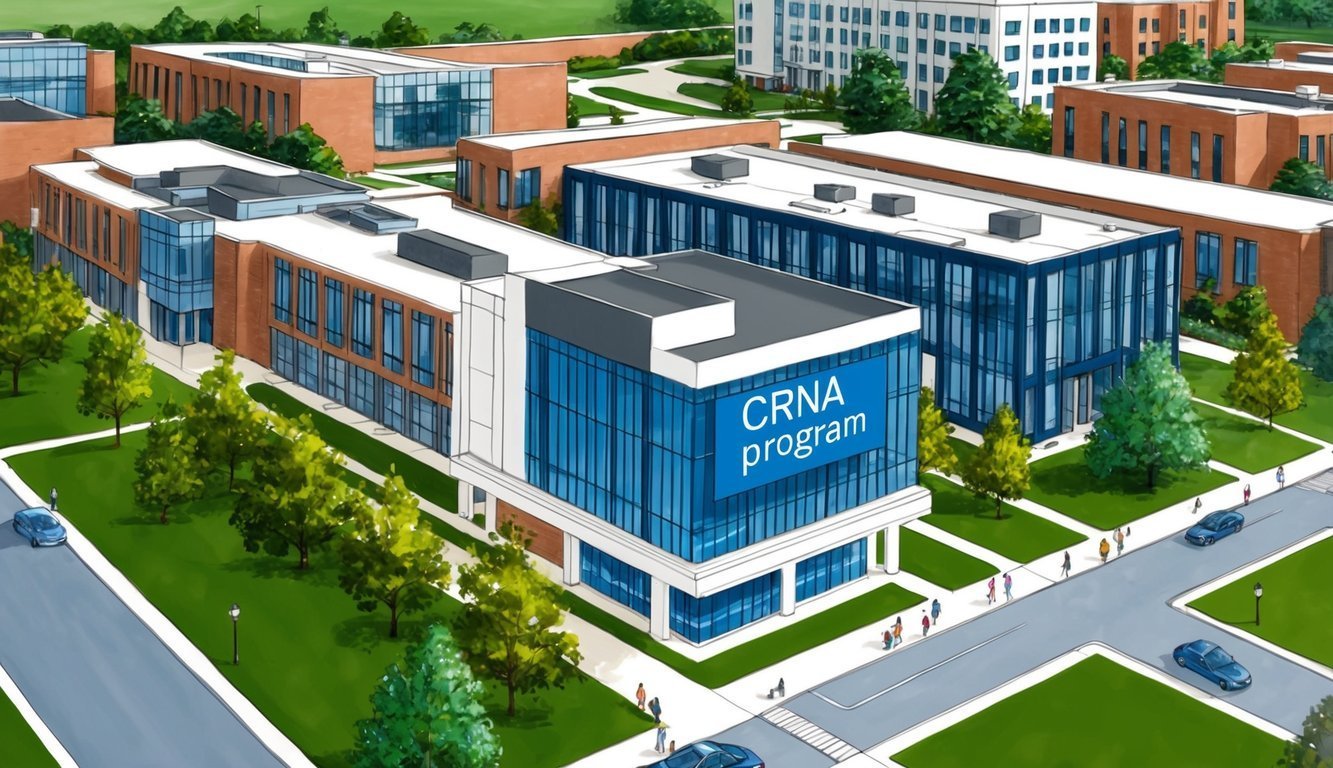If you are considering a rewarding career as a Certified Registered Nurse Anesthetist (CRNA), you need to know where to find the best CRNA programs nearby.
Finding CRNA programs near you can streamline the application process and help you plan for your education and future career.
A nurse anesthetist plays a critical role in delivering anesthesia care, making this an exciting and responsible profession.
As you explore your options, make sure to look for accredited nurse anesthesia programs that meet educational standards.
Consider factors like program length, financial support, and clinical experiences offered to help you make an informed choice.
With a solid understanding of the essentials of nurse anesthesia education, you can set yourself on a path to a fulfilling profession in healthcare.
Key Takeaways
- Find CRNA programs that are accredited and meet educational standards.
- Explore financial considerations available to support your education.
- Understand the importance of hands-on clinical experiences in the programs.
Understanding the Nurse Anesthetist Role
The role of a nurse anesthetist is crucial in providing anesthesia care to patients.
You will manage various aspects of anesthesia practice and ensure patient safety throughout the surgical process.
Below are key areas that define this profession.
Certified Registered Nurse Anesthetist (CRNA)
A Certified Registered Nurse Anesthetist (CRNA) is an advanced practice registered nurse with specialized education and training in anesthesia.
To become a CRNA, you need to have at least a master’s degree in nurse anesthesia, although many programs now offer doctoral degrees.
CRNAs administer anesthesia for all types of procedures, from major surgeries to pain management cases.
They are responsible for monitoring patient vitals and adjusting anesthesia levels to maintain safety and comfort.
This ensures that patients receive tailored care during their procedures.
To practice, you must hold a valid registered nurse license and pass the national certification examination.
You can find more details about the requirements at the American Association of Nurse Anesthetists.
Scope of Anesthesia Practice
The scope of anesthesia practice for CRNAs is extensive.
You will work in various settings, including hospitals, outpatient surgery centers, and pain management clinics.
The practice includes administering anesthesia, monitoring patient response, and providing post-anesthesia care.
Your role also involves collaborating with surgeons and other healthcare professionals.
This interdisciplinary approach enhances patient outcomes and ensures high-quality care.
CRNAs can also lead anesthesia teams and provide education to other healthcare staff about anesthesia practices.
CRNAs are trained to manage emergencies, such as allergic reactions or cardiac events.
This skill set is vital for maintaining patient safety during anesthesia care.
Critical Care Experience Requirements
Before entering a nurse anesthesia program, you must gain critical care experience.
Most schools require at least one year of experience in a critical care setting, such as an intensive care unit (ICU) or emergency room.
Experience in these high-pressure environments helps develop essential skills in patient assessment and critical thinking.
You will learn to make quick decisions based on the patient’s condition, which is vital during anesthesia administration.
Many CRNA programs outline specific qualifications for critical care experience.
Acquiring this background will strengthen your application to competitive programs.
Essentials of Nurse Anesthesia Programs

Nurse anesthesia programs prepare you for a critical role in healthcare.
Understanding the curriculum, clinical experience, and program structure is essential for making informed choices.
Curriculum and Coursework
The curriculum of nurse anesthesia programs is rigorous and covers key topics in anesthesia care.
Courses typically include:
- Pharmacology: Study of anesthetic agents and their effects on the body.
- Anatomy and Physiology: Understanding the body’s systems to administer safe anesthesia.
- Advanced Health Assessment: Skills to assess patient health before anesthesia.
You will also learn about ethics in anesthesia, pain management, and emergency procedures.
Many programs follow the Council on Accreditation of Nurse Anesthesia Educational Programs (COA) standards.
This ensures the education you receive is relevant and comprehensive.
Programs may also incorporate case studies to enhance your critical thinking and decision-making skills.
For more detailed information, check the Council on Accreditation website.
Clinical Experience and Training
Clinical experience is a cornerstone of nurse anesthesia education.
You are required to complete a specific number of clinical hours, typically ranging from 600 to 1,200 hours, depending on the program.
During this time, you work under the supervision of experienced CRNAs or anesthesiologists.
This hands-on training includes:
- Patient Assessment: Evaluating patients pre-operatively.
- Anesthesia Administration: Gaining experience in different types of anesthesia.
- Monitoring: Learning to monitor patients’ vital signs during procedures.
This practical training is crucial for developing the skills needed to ensure patient safety and comfort.
Through diverse clinical experiences, you will build confidence and competence in your practice.
Program Length and Structure
Nurse anesthesia programs usually take between 2 to 4 years to complete, depending on whether you are attending full-time or part-time.
The structure commonly includes:
- Didactic Courses: Classroom-based learning that covers theoretical knowledge.
- Clinical Rotations: Hands-on experience in various specialties, such as pediatrics and trauma.
Most programs culminate in a Doctor of Nursing Practice (DNP) degree, which aligns with the current educational requirements for CRNAs.
Many accredited schools offer flexible schedules to accommodate working professionals.
It’s key to ensure that the program you choose is accredited and meets certification requirements when you graduate.
Accreditation and Educational Standards

Accreditation is crucial for nurse anesthesia programs.
It ensures that schools meet specific educational standards.
Understanding these standards can help you choose the right program for your career.
Council on Accreditation of Nurse Anesthesia Educational Programs
The Council on Accreditation of Nurse Anesthesia Educational Programs (COA) is the recognized accrediting body for nurse anesthesia programs in the U.S. Its primary role is to ensure that programs provide quality education and training.
Programs accredited by the COA must meet specific standards regarding curriculum, faculty qualifications, and resources.
This accreditation process helps you find reliable programs that prepare you for your role as a certified registered nurse anesthetist (CRNA).
You can access the COA’s list of accredited programs through the Council on Accreditation website.
Accreditation Status and Importance
Being enrolled in an accredited program is vital.
It affects your eligibility for certification and financial aid.
Programs without proper accreditation may not meet the rigorous standards necessary for successful training.
Accreditation assures you that the program adheres to high-quality educational standards.
This can impact your job opportunities and earning potential after graduation.
When choosing a program, always verify its accreditation status.
You can find accreditation details through the COA or on the program’s official website.
DNP vs. DNAP: Understanding the Degrees
There are two primary degrees for CRNAs: Doctor of Nursing Practice (DNP) and Doctor of Nurse Anesthesia Practice (DNAP).
Both degrees prepare you for advanced nursing roles but focus on different aspects of practice.
-
DNP: This degree emphasizes evidence-based practice and leadership in nursing. It typically covers a broad range of nursing topics.
-
DNAP: This degree is specifically tailored to anesthesia practice. It focuses on advanced nurse anesthesia skills.
Deciding between these degrees depends on your career goals and interests.
Consider what specific training you need for your future as a CRNA.
Understanding these options will help you make informed choices.
Selecting the Right CRNA Program
Choosing the right Certified Registered Nurse Anesthetist (CRNA) program involves considering various factors.
Location, admission criteria, and class size are key elements that can shape your educational experience.
Location-Based Search: CRNA Schools Near Me
When searching for CRNA programs, proximity can play a significant role in your decision.
Look for schools that are conveniently located to reduce travel time and costs.
In Florida, you can consider programs such as the one offered by University of Florida or Florida Atlantic University.
Both institutions provide solid educational foundations.
Additionally, schools like the University of Pennsylvania and Villanova University in Pennsylvania are renowned for their nurse anesthesia programs.
They’re not just prestigious but also strategically located for many students in the region.
Use resources like Nurse.org to find comprehensive lists of CRNA programs near you.
Admittance Requirements and Class Size
Before applying, know the admission requirements for each CRNA program.
Most schools require a Bachelor of Science in Nursing (BSN) or a Master’s in Nursing (MSN).
Here’s a brief overview of general requirements:
| Institution | Requirements |
|---|---|
| University of Pittsburgh | BSN or MSN from accredited institution |
| Villanova University | BSN required; minimum GPA set |
| University of Pennsylvania | BSN or MSN recommended with clinical experience |
Class size can also impact your learning experience.
Smaller class sizes often allow for more personalized attention.
Schools often have varying class sizes.
Check statistics for your preferred schools to assess how this may affect your educational journey.
Larger programs may have more resources but can lead to less individualized instruction.
Financial Considerations and Support

As you explore CRNA programs, understanding the financial aspects is crucial.
You will need to consider tuition costs, program fees, and potential financial aid opportunities that can ease your financial burden.
Tuition Costs and Program Fees
The cost of CRNA programs can vary widely based on the institution and location.
Generally, tuition can range from $30,000 to $60,000 for the entire program.
Here’s a breakdown of costs for some schools:
| School | Estimated Tuition Cost |
|---|---|
| University of Southern California | $1,928 per unit |
| Duke University | Approx. $60,000 |
| Columbia University | Approx. $50,000 |
| University of Arizona | Varies by program |
In addition to tuition, you may need to budget for fees such as application fees, clinical supplies, and textbooks.
Financial Aid Opportunities
Many options are available to help you fund your education.
Here are some key financial aid opportunities to consider:
- Federal Student Loans: These loans typically offer lower interest rates and flexible repayment options.
- Scholarships: Organizations like the American Association of Nurse Anesthetists (AANA) often provide scholarships for CRNA students.
- Grants: Unlike loans, grants do not need to be repaid. Look for federal or state grants applicable to nursing education.
- Employer Sponsorship: Some healthcare employers may offer financial assistance in exchange for a commitment to work for them after graduation.
Exploring these financial aid options can significantly reduce your expenses during your CRNA program.
Frequently Asked Questions

This section provides clear answers to common questions about CRNA programs.
You will find specific information about enrollment requirements, program lengths, online options, affordability, personal program selection, and admission competitiveness.
What are the requirements to enroll in a CRNA program in Florida?
To enroll in a CRNA program in Florida, you generally need a bachelor’s degree in nursing or an appropriate field.
You must also hold a valid RN license and have at least one year of critical care experience.
Some programs may require a master’s degree or additional certifications.
How long is the typical duration of CRNA programs?
Most CRNA programs take about 3 years to complete.
This includes both classroom instruction and clinical training.
Some accelerated programs may be available, while part-time options can extend the duration.
Which accredited CRNA programs are available online?
Several CRNA programs offer online components.
Notable options include programs from Texas A&M University and the University of Southern Indiana.
Always check for program accreditation through the Council on Accreditation of Nurse Anesthesia Educational Programs to ensure quality.
What is the most affordable CRNA school in Florida?
The University of Florida is often cited as one of the more affordable options for CRNA education in Florida.
Tuition costs can vary, so it’s important to research specific programs to compare expenses, including fees and living costs.
How can I determine which CRNA program is the best for me?
Consider factors such as location, cost, and program format.
Also, review the curriculum, faculty qualifications, and available clinical opportunities.
Visiting campuses and talking to current students can provide valuable insights.
What is considered the least competitive CRNA school to gain admission to?
Some programs may have lower admission standards compared to others.
For example, schools like the University of North Florida might have less competitive entry requirements.
You can research each school’s acceptance rates and prerequisites for a better idea of your chances.

